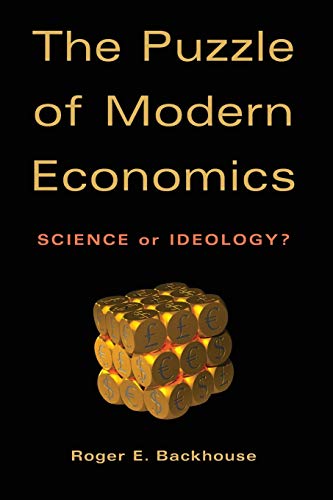Items related to The Puzzle of Modern Economics: Science or Ideology?

Synopsis
This book cuts through the confusion and controversy about whether modern economics has succeeded or failed.
"synopsis" may belong to another edition of this title.
About the Author
Roger E. Backhouse is Professor of the History and Philosophy of Economics at the University of Birmingham, where he has taught since 1980, and at the Erasmus University Rotterdam. In 2007 he was Ludwig Lachmann Research Fellow in the Department of Philosophy at the London School of Economics. In 1998–2000 he held a British Academy Research Readership. He has also taught at University College London, Keele University, the University of Bristol, the University of Buckingham, and the University of Oporto. Professor Backhouse is the co-editor of The History of the Social Sciences since 1945 (with Philippe Fontaine, Cambridge University Press, 2010), No Wealth But Life: Welfare Economics and the Welfare State in Britain 1880–1945 (with Tamotso Nishizawa, Cambridge University Press, 2010), and The Unsocial Social Science? Economics and Neighboring Disciplines Since 1945 (forthcoming). He also coedited The Cambridge Companion to Keynes (with Bradley W. Bateman, Cambridge University Press, 2006). Professor Backhouse is also author of The Ordinary Business of Life and The Penguin History of Economics. He has written for a number of journals, including Economica, Journal of Economic Perspectives, History of Political Economy, Journal of the History of Economic Thought, and Journal of Economic Methodology. He has been review editor of the Economic Journal, editor of the Journal of Economic Methodology, and associate editor of the Journal of the History of Economic Thought.
"About this title" may belong to another edition of this title.
FREE shipping within U.S.A.
Destination, rates & speedsSearch results for The Puzzle of Modern Economics: Science or Ideology?
The Puzzle of Modern Economics : Science or Ideology?
Seller: Better World Books, Mishawaka, IN, U.S.A.
Condition: Very Good. Former library book; may include library markings. Used book that is in excellent condition. May show signs of wear or have minor defects. Seller Inventory # 15579173-75
Quantity: 2 available
The Puzzle of Modern Economics: Science or Ideology?
Seller: Books From California, Simi Valley, CA, U.S.A.
paperback. Condition: Good. Book shows minor shelf wear and is slightly bending/warping. Pages are clean, text and pictures are intact and unmarred. Seller Inventory # mon0003678539
Quantity: 1 available
The Puzzle of Modern Economics: Science or Ideology?
Seller: Books From California, Simi Valley, CA, U.S.A.
paperback. Condition: Very Good. Seller Inventory # mon0003682153
Quantity: 2 available
The Puzzle of Modern Economics: Science or Ideology?
Seller: Smith Family Bookstore Downtown, Eugene, OR, U.S.A.
Trade Paperback. Condition: Very Good. text clean and unmarked. binding tight. covers have very light wear. edges of pages have very light wear. Seller Inventory # 5032494
Quantity: 1 available
The Puzzle of Modern Economics: Science or Ideology?
Seller: Affordable Collectibles, Columbia, MO, U.S.A.
Paperback. Condition: Very Good. No marks. Only light wear. Seller Inventory # SKU1012134
Quantity: 1 available
The Puzzle of Modern Economics: Science or Ideology?
Seller: Lucky's Textbooks, Dallas, TX, U.S.A.
Condition: New. Seller Inventory # ABLIING23Feb2416190006080
Quantity: Over 20 available
Puzzle of Modern Economics : Science or Ideology
Seller: GreatBookPrices, Columbia, MD, U.S.A.
Condition: New. Seller Inventory # 9808550-n
Quantity: Over 20 available
Puzzle of Modern Economics : Science or Ideology
Seller: GreatBookPrices, Columbia, MD, U.S.A.
Condition: As New. Unread book in perfect condition. Seller Inventory # 9808550
Quantity: Over 20 available
The Puzzle of Modern Economics: Science or Ideology?
Seller: California Books, Miami, FL, U.S.A.
Condition: New. Seller Inventory # I-9780521532617
Quantity: Over 20 available
The Puzzle of Modern Economics (Paperback)
Seller: Grand Eagle Retail, Bensenville, IL, U.S.A.
Paperback. Condition: new. Paperback. Does economics hold the key to everything or does the recent financial crisis show that it has failed? This book provides an assessment of modern economics that cuts through the confusion and controversy on this question. Case studies of the creation of new markets, the Russian transition to capitalism, globalization, and money and finance establish that economics has been very successful where problems have been well defined and where the world can be changed to fit the theory, but that it has been less successful in tackling bigger problems. The book then offers a historical perspective on how economists have, since the Second World War, tried to make their subject scientific. It explores the evolving relationship between science and ideology and investigates the place of heterodoxy and dissent within the discipline. Does economics hold the key to everything or does the recent financial crisis show that it has failed? The answer is somewhere in between - economics can do some things well but does others badly. Economists have tried to make their discipline scientific, but ideology has not been eliminated. Shipping may be from multiple locations in the US or from the UK, depending on stock availability. Seller Inventory # 9780521532617
Quantity: 1 available

